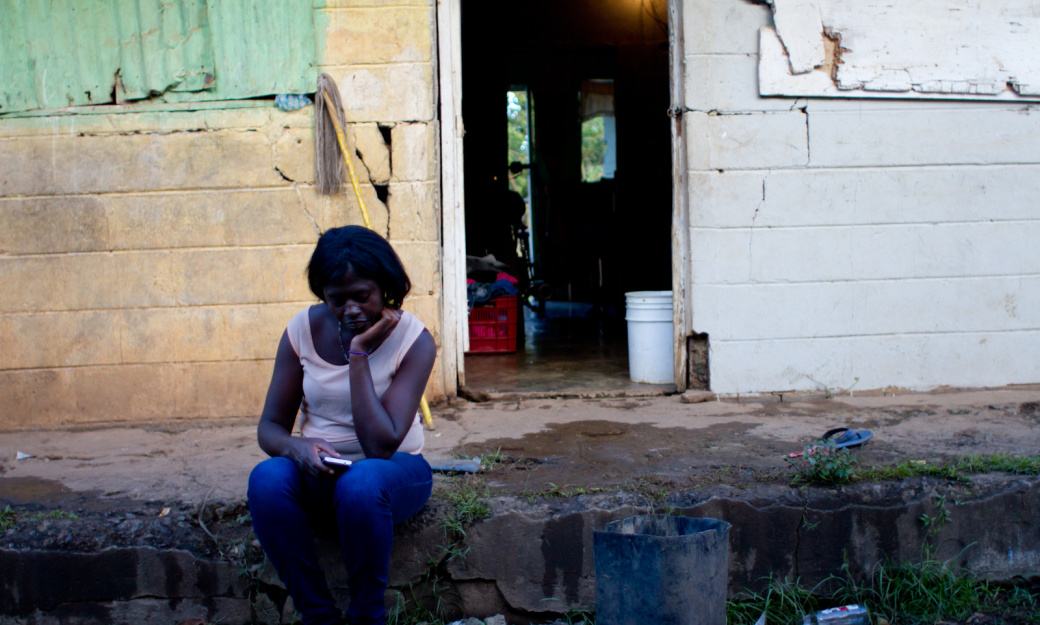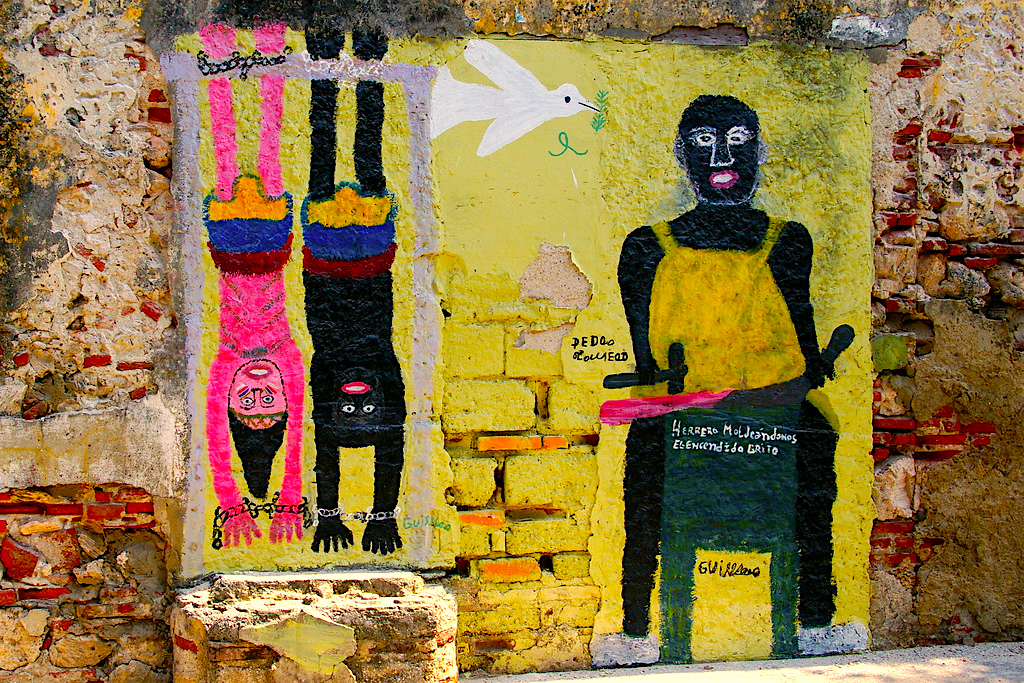Why Being ‘Haitian’ Made Them Stateless

Haiti has once again plunged into a familiar pattern of political upheaval as a presidential election that was delayed twice already was postponed indefinitely. Last Sunday’s runoff would have had just one candidate—frontrunner Jovenel Moïse, a banana exporter and the handpicked successor of his friend, President Michel Martelly. Jude Célestin, the runner-up in October’s disputed first round, called the ballot a “ridiculous farce” and refused to participate. His supporters torched voting centers, barricaded roads, and clashed with police. Martelly, who was due to step down Feb. 7, seems poised to continue to govern. What happens next is anyone’s guess.
These are only the latest misfortunes to strike a nation that has been plagued by political instability since long before 2010’s massive earthquake that devastated Port-au-Prince and its surrounding areas, and long before the United Nations negligently introduced cholera to Haiti. But it is a false presumption that the troubled state in which Haiti finds itself is somehow entirely its own making.
 U.S. statesmen have done far more to shape Haiti’s current state of affairs than the typical Haitian has. In the 1990s President Bill Clinton pushed artificially low-priced American rice and other crop exports onto Haiti, a policy blamed for undermining Haiti’s own agricultural sector, which remains uncompetitive to this day. After the earthquake, Haiti’s reconstruction commission, which Clinton co-chaired, decried that Haitians themselves had virtually no say in the rebuilding of their own nation. And last year it was revealed that the U.S. State Department, under then-secretary Hillary Clinton, issued a $100,000 grant to support the political party of Martelly, the man many agree has been the foremost obstacle to a peaceful democratic transfer of power.
U.S. statesmen have done far more to shape Haiti’s current state of affairs than the typical Haitian has. In the 1990s President Bill Clinton pushed artificially low-priced American rice and other crop exports onto Haiti, a policy blamed for undermining Haiti’s own agricultural sector, which remains uncompetitive to this day. After the earthquake, Haiti’s reconstruction commission, which Clinton co-chaired, decried that Haitians themselves had virtually no say in the rebuilding of their own nation. And last year it was revealed that the U.S. State Department, under then-secretary Hillary Clinton, issued a $100,000 grant to support the political party of Martelly, the man many agree has been the foremost obstacle to a peaceful democratic transfer of power.
Haitians today face all manner of stigma—for perennially being “the poorest nation in the western hemisphere,” for devolving into political chaos every few years. Much of that prejudice takes root just next door, in the country with which it shares the island of Hispaniola.
In January of last year I met Felix Callo Marcel, a 22-year-old born in the Dominican Republic but who was refused a Dominican identity card and even had his school enrollment certificate confiscated by the Dominican government. His parents were immigrants from Haiti. Marcel is one of an estimated 200,000 people who have had their nationality officially stripped away from them. Now, tens of thousands of people of Haitian heritage are being deported or fleeing for their own safety to Haiti, where many live in refugee camps akin to those that popped up after Haiti’s devastating 2010 earthquake.
Haitians have long struggled to find their place in the world. When Haiti won independence from France in 1804 and became the only modern nation founded by rebelled slaves, other countries, including the United States, dared not acknowledge its existence, the precedent being an uncomfortable one for a world that still ran on slavery.
To gain the right to engage in trade with the world around it, Haiti had to purchase that acknowledgement from France at a staggering cost. Repayment of Haiti’s “independence debt” took two centuries and required the sale of many of Haiti’s trees and other natural resources. It was also a major factor behind Haiti’s decision to invade the Spanish side of the island in 1822. To the embarrassment of many Dominicans, their forefathers endured 22 years of Haitian occupation before at last winning their independence from Haiti in 1844.
Since that time, the economies and geopolitics of these two nations have remained intertwined. The Dominican government imported thousands of Haitian laborers to farm sugarcane, the industry that propelled its economy through the twentieth century. Haitian labor, in agriculture, construction, and tourism, continues to prop it up in the twenty-first. Last year the president of the Dominican Housing Builders and Developers Association, Fermin Acosta, told Bloomberg that at least 260,000 Haitians are presently employed under the table in the Dominican construction industry.
“If the Haitians did not come across at great risk, running across the border, large portions of the DR economy would not grind to a halt, but they would slow quickly,” a U.S. State Department official told me. “It’s sort of like what you have in the United States—all the jobs that Mexicans do coming across the border are the jobs that you yourselves don’t want to do.”
Dominicans take pride in their recent emergence as a middle-income nation. And yet, there’s no denying that Dominicans built their modern economy on the backs of their other half. Now it is the kids and grandkids of those Haitian immigrants whom the government says no longer belong.
The current situation has its roots in the popular Dominican desire to expunge themselves and their nation from all things Haitian. The urge to do so began nearly a century ago with the rise of the dictator Rafael Trujillo. Trujillo’s 1937 killing of tens of thousands of Haitian laborers in the Dominican Republic is what gave the Massacre River that divides the two nations its forbearing nickname. But in modern times Dominicans are adapting their anti-hatianismo to the realm of politics—and most prominently through the high profile case of Juliana Deguis Pierre.
Pierre is a woman of Haitian heritage who was born in the Dominican Republic, but in 2013 the Dominican Constitutional Court stripped her of her Dominican nationality. The justices reasoned that Dominicans of Haitian descent are unqualified for Dominican citizenship because their parents were merely “in transit” through the Dominican Republic at the time of their birth. To follow this argument takes no small amount of magical thinking. Hispaniola is a two-nation island. To where might they have been in transit to?
Nonetheless, that argument has become the official justification for creating a stateless people—and the justification for the present deportations of thousands of Jus Soli (“by birth”) Dominicans to Haiti, a country many of them have never known, with a tongue many do not speak. According to a 2014 report by the U.S. State Department, “the descendants of Haitian migrants who worked and settled in the country throughout the 20th century—who were born in the country prior to 2010 and enjoyed a right to Dominican nationality—faced an increased risk of becoming stateless.”
For their part, Dominican officials argue that these people are not truly stateless—they are entitled to Haitian citizenship and can apply for it in Haiti or from the Haitian embassy. But many don’t have documents with which they could establish their Haitian nationality. In many cases, the Dominican Republic denied them their birth certificates or identity cards. In some cases, Dominican officials even confiscated what documents they had.
Unsuccessful at reversing the tides of nationalism within the Dominican Republic, human rights advocates are beginning to do so from afar. The Inter-American Court of Human Rights has ruled repeatedly that the Dominican Republic’s laws and court rulings on the matter violate its obligations under the American Convention on Human Rights. But there is little mechanism for international enforcement or sanctions.
Pressure from human rights tribunals, however, is seen by many Dominicans as an impediment upon their national sovereignty. It’s for this reason that in August, 560 former U.S. Peace Corps volunteers in the Dominican Republic argued in a letter to Secretary of State John Kerry that by continuing to provide military funding to the Dominican Republic, the State Department would be violating the so-called Leahy Law, which forbids U.S. military funding to units responsible for gross violations of human rights.
The State Department doesn’t seem to have budged. Last year it requested an additional $600,000 to train Dominican border guards—the ones conducting the majority of deportations—in continuation of the $17.5 million it has spent to do so since 2013. In his response to the Peace Corps volunteers, Kerry wrote that he had “personally raised” his concerns over the matter with the Dominican President. He said the State Department has urged Dominican officials not to undertake mass deportations, and that the Dominican government had assured the international community that no one would be wrongfully deported.
But numerous media accounts and reports have documented that the Dominican government has failed to live up to its word. Hypocritically, in private, State Department officials acknowledge this. Last year a State Department official, speaking on the condition of anonymity, expressed concern to me that individuals who were “in fact entitled to citizenship under laws of the Dominican Republic” were being required to go through a process that would deny them that citizenship. The official also confirmed reports that the Dominican government was failing to play by it’s own rules, on some occasions demanding to see Dominican birth certificates even from people who were attempting to register themselves as foreigners.
“There’s still this natural to and fro in terms of nationalism on both sides,” the official told me, “which helps put a bit more visibility on this beyond what would normally be for an administrative process for registering citizens based on their birth.”
As Dominicans prepare to head to the polls in May, candidates from all three of the foremost political parties have described the security and defense of their nation as dependent upon the expulsion of Haitians. “In some cases it’s been politically expedient for Dominican politicians to decide that the Haitian issue is something they should focus on,” the State Department official said.
Dominican Revolutionary Party candidate Miguel Vargas has defended the recent “regularization” process that resulted in tens of thousands of people remaining stateless, as has former president Hipólito Mejía, who denies that the Dominican Republic has mistreated them. The frontrunners—former president Leonel Fernández and current president Danilo Medina—both chose as their minister of ethics Marino Vinicio Castillo Rodríguez, founder of the ultra-nationalist, anti-Haitian party that paved the way for the recent nationality stripping. In August, Castillo, who was originally appointed to Congress by the Haitian-butchering dictator Trujillo, called for mass deportations, to reverse what he has called “a passive Haitian invasion.”
“It is a crucial matter for the very existence of this state and for the sovereignty of the Dominican Republic,” he said. But today in Haiti, there is no armed rebellion threatening to invade the Dominican Republic. The Haitians are not the ones who are unlawfully stripping away the nationality of tens of thousands of people. Unwilling to abide by domestic or international naturalization laws, the Dominican Republic has undermined its own national legitimacy.
Besides, with a president whose term ends in less than a week and with nobody to replace him, Haitians have their own sovereignty to defend.
Jacob Kushner reports on immigration and statelessness. He has lived on both sides of Hispaniola, reporting on Dominican-Haitian relations since 2007. His recent reporting was made possible by a Daniel Pearl Investigative Journalism Initiative fellowship from Moment Magazine.

